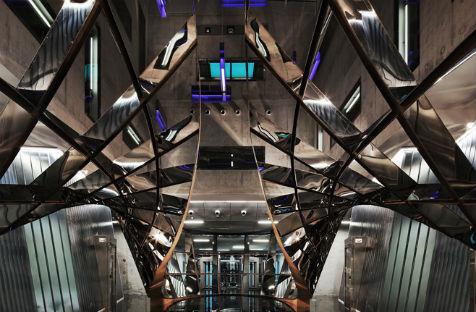China has unveiled plans to design a tax-free culture hub in the heart of Beijing, right next to the capital’s airport. Named The Beijing Freeport of Culture, the culture hub is envisioned to become a thriving centre for entertainment and culture featuring art storage warehouses, film and television production facilities and offices for a range of creative businesses.
Backed by the Beijing Gehua Cultural Development Group, this $800 million project follows in the lines of an old report by ArtsHub which noted that the company had plans to build a $100 million art storage facility in Beijing. Now, it appears, the project has only grown in scope.
‘The government and our group had the idea to export culture to the world,’ general manager of the Beijing Gehua Cultural Development Group Wang Yudong told The Wall Street Journal. ‘Already, there’s a government policy for free-trade areas. We’re just applying it to culture.’
Considering China’s cultural growth, Beijing seems to be the perfect location for a tax-free cultural hub. Not only does it boast the world’s largest art market, but it has also grown to become the world’s second-largest film market. With this in mind, Gehua believes they can create a hub which will attract at least 50 foreign companies to do business with the Freeport by 2016.
The ambitious project follows the same path taken by industrial industry in the 1990s, who transformed China into a thriving manufacturing centre after deciding to implement certain tax-free zones. Yet doubts surrounding the success of a culture Freeport remain as Ji Tao, a researcher with the Auction Research Institute of Central University of Finance and Economy, does not believe that the creative industries will embrace a Freeport in the same way as the industrial industry.
‘This is a new concept made up out of nothing,’ he said. ‘A Freeport is for industrial products, which need to be processed with raw material inputs. But culture isn’t like this.’
Despite the fact that the proposed Freeport is a completely untried method in the creative industries, Yudong is confident that it will work.
‘We are doing the same [as in other economic zones],’ he said. ‘We’re just offering basic services, putting together a platform for companies to work here.’
If anyone should know about the inner workings of the cultural industry, it is Gehua. The company is closely involved with the country’s culture ministry and is renowned for having played a significant role in several major Chinese cultural events including the staging of the 2008 Beijing Olympics and Beijing Design Week.
Amid reports that a high tax on art in China has deterred collectors from buying art, the Freeport could be just the thing to reinvigorate collector’s buying habits as the hub will provide a them with the opportunity to bring their purchases to Beijing to hold. Currently, imported works of art are subjected to a 34% tax of the purchased value. This has led many Chinese collectors to lie about the true value of their purchased art, but the Chinese government has adopted a tough crackdown on such behavior. According to Kevin Ching, chief executive officer of Sotheby’s Asia, the current Chinese tax process is ‘onerous and complex’ but the Freeport could provide a new and convenient way to trade art.
Gehua has also joined forces with Sotheby’s, the first time a foreign auction house has been allowed to run in China. The major auction house was given an 80% stake in a jointly held auction company which will operate out of the upcoming facility.
The art warehouse facility is likely to be similar to the Singapore Freeport facility, which was also designed by Euroasia Investment SA. Although the companies have yet to sign a contract, both believe that the Freeport will be up and running by next year.
‘At first, it seemed quite odd to build a Freeport in China. We didn’t see who would use it,’ chairman of Euroasia Tony Reynard said. ‘After exploration, we saw more opportunities.’
The Freeport is expected to partially open next year and is sure to be a big help to major events like TEFAF Beijing, a Netherlands-based art fair that we recently reported will be hosting a fair in Beijing.



_Encounters-in-Reflection_Gallery3BPhoto-by-Anpis-Wang-e1745414770771.jpg?w=280)

